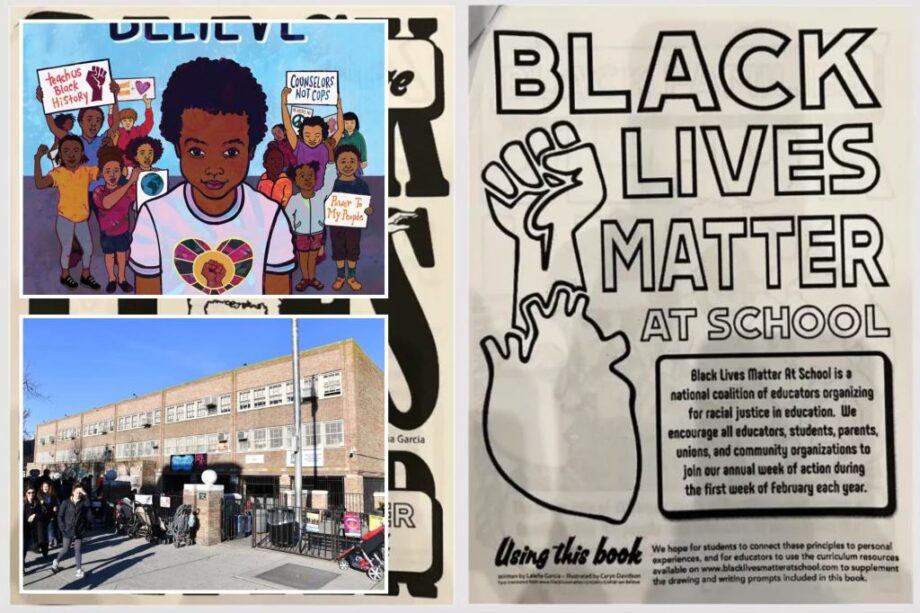An elementary school in New York City is providing children as young as 5 with a Black Lives Matter coloring book that emphasizes inclusive lessons such as “queer and transgender affirming” concepts, revolutionary politics, and calls to “fund counselors not cops” as part of their Black History Month education.
PS 321 in Brooklyn’s Park Slope, catering to students from kindergarten through fifth grade, distributed the “What We Believe: A Black Lives Matter Principles Activity Book” coloring book last week as part of their Black History Month curriculum.
The book, aligned with the 13 “guiding principles” of the national Black Lives Matter at School program, was assigned as coursework for the young students and includes sections highlighting “transgender affirming” and “queer affirming” themes.
One page in the book explains, “When a person is born, their grown-ups generally decide whether to call them a girl or a boy. Sometimes that decision doesn’t match who the person really is, and that person is transgender.”
The book also outlines various national demands of the BLM movement and suggests ways children can show support, such as advocating for “counsellors in schools instead of police,” promoting “restorative justice,” and incorporating “black history and ethnic studies.”
Some parents raised concerns that the coloring book did not sufficiently cover black history and presented controversial ideas as facts.
One mother of a fourth grader, as reported by The Free Press, stated, “It’s not necessarily true. It’s not like every black person believes in these principles.” She also mentioned that the book lacked specific details and felt vague in its approach.
Several parents expressed dissatisfaction with the guiding principles of the movement, which are prominently displayed on the website of Black Lives Matter at School, the organization behind the coloring book. This organization offers educational materials for schools nationwide, including resources for early childhood education.
For instance, under the “Transgender Affirming” section on the Black Lives Matter at School site, it emphasizes the importance of “dismantling cisgender privilege” through self-reflection and consistent effort.
Some parents at PS 321 also objected to a section titled Empathy that used the term “comrades,” which they interpreted as a political reference promoting communist ideologies.
One mother of a fourth grader, whose grandparents fled China, criticized the use of the term “comrades,” stating, “They are using words that I don’t think are appropriate for elementary school.”
PS 321, known for being one of the top elementary schools in the city with a demographic largely consisting of white students (67%), while only 3% are black, according to city records.
Parents acknowledged that while some lessons from the book and the broader BLM curriculum were beneficial, such as learning about forgiveness, others were criticized for being rooted in revolutionary politics.
For example, the “Black Villages” principle challenges the traditional nuclear family structure, while the “Intergenerational” section advocates for a network free from ageism and adultism.
Robert Pondiscio, a teaching expert and senior fellow at the American Enterprise Institute, commented on the controversy, expressing skepticism about the book’s intent to indoctrinate children.
“But the poor judgment and lack of common sense among educators in selecting material is sometimes jaw-dropping and inexcusable,” he shared on X.
On the other hand, Phil Wong, a parent and former president of Community Education Council 24 in Queens, criticized the focus on racial justice associated with the coloring book.
“If schools really want to teach racial justice, then the materials should be about Dr. Martin Luther King Jr., Frederick Douglas, or Harriet Tubman. Recent movements have erased these names from history classes,” Wong noted.
The school did not provide clarity on how many students received the coloring book last week, with one parent mentioning that they only discovered it when children were sent home for remote learning due to a winter storm.
During midwinter break when schools were closed in Park Slope, there was a lack of parent presence in the neighborhood, with children mainly accompanied by nannies.
PS 321 declined to comment on the distribution of the BLM coloring book until school activities resume.
The NYC Department of Education confirmed the coloring book’s existence but refrained from addressing queries about its distribution or implementation in other public schools within the city.
Instead, a DOE spokesperson advised, “Anytime parents have a concern about resources used in school, we encourage them to share their concerns with the school principal or district superintendent.”
Additional reporting by Georgett Roberts



